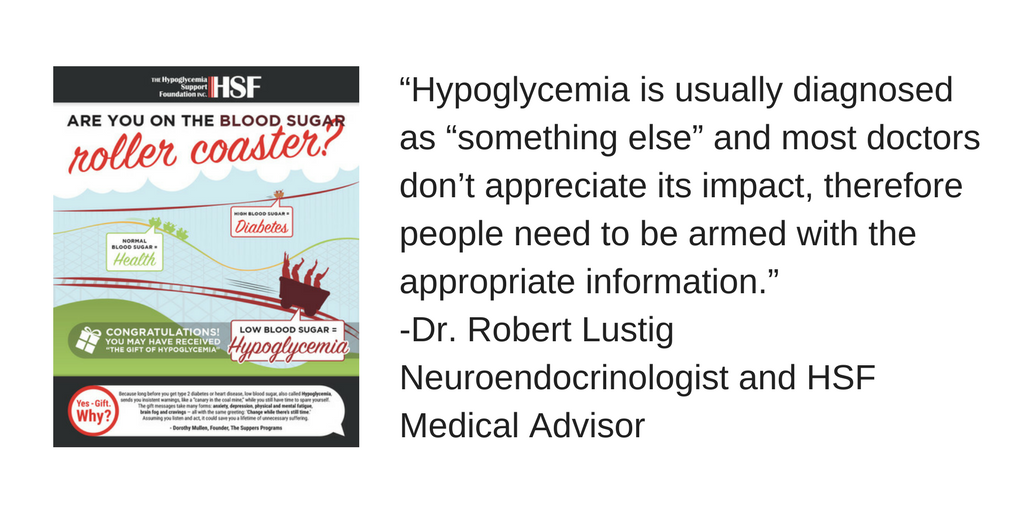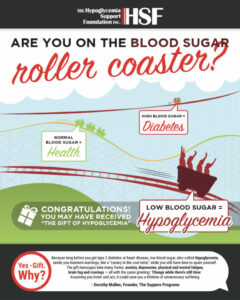In every minute taken to read this blog post, someone is dying from preventable diet-related disease.
More people have died from metabolic disease since 1980 than the [i]sum of all the world’s military conflicts combined. This is more than a burgeoning health issue – it is a [ii]national security issue with profound economic implications. The HSF seeks funding, support and partnership to develop much needed educational content and programs for medical professionals and their patients that focuses on metabolic health and nutrition – preventing, treating, and resolving diet-related issues. The urgency of this work has never been greater.
The HSF is a 39-year old nonprofit organization, founded by a patient advocate, dedicated to forging a healthier world empowered by science-based nutrition and the prevention, early detection, and management of metabolic disease. Hypoglycemia, also known as low blood sugar, is one of the earliest and most frequently experienced indicators of metabolic dysfunction by the general population. For decades, the HSF has been filling a critical gap in educating the public about a health issue recognized as a “canary in the coal mine” of metabolic disease. The HSF has forged a compelling new strategic vision and is poised to expand its impact at a critical moment in U.S. public health history.
Dr. Seale Harris, the [iii]pioneer researcher of hyperinsulinism, viewed hypoglycemia as a harbinger of more complex metabolic disease as early as 1924: “The low blood sugar of today is the diabetes of tomorrow.” Today, low blood sugar is an issue that affects the majority of the population in some form or another, and is a key indicator that metabolic dysfunction is at play. Patients, adequately informed by their doctors, can take action to address diet and lifestyle factors that are driving the condition before more advanced diet-related disorders progress. Unfortunately, many doctors are poorly prepared to diagnose and treat the condition within the context of metabolic (systemic) dysfunction.
In 1958, the year after Dr. Seale died, slightly more than 1.5 million people were diagnosed with diabetes each year. In 2015, the [iv]rate had increased to over 23 million per year. Since 1980, [v]rates of type 2 diabetes have quadrupled. [vi]More than half of Americans are now either pre-diabetic or diabetic. [vii]Nearly half of adult Americans are obese, a rate that has nearly doubled since 1980, while [viii]childhood obesity and diabetes diagnoses have tripled. [ix]One in two adults in the U.S. has a chronic disease. [x]One out three children born in 2000 will have diabetes.
Chronic disease rates have escalated, and now exceed communicable disease. While 80% of the obese population suffer from metabolic disease, it is important to know that 40% of the non-obese also suffer from metabolic disorders. Conditions such as non-alcoholic fatty liver disease (NAFLD) are not easy to detect and are [xi]increasing at alarming rates in adults and children. Metabolic disease erodes our health care system both directly (hypoglycemia, type 2 diabetes, NAFLD) and indirectly (heart attacks, strokes, cancer, dementia), while prevention programs are lacking funding and support.
National [xii]health care expenditures are currently $3.2 trillion – 75% of this results from chronic disease, and 75% of this is preventable and diet-related. An estimated $1.8 trillion is being wasted. One study showed that a 10% reduction in mortality from heart disease would have a value of $5.5 trillion to current and future generations, while a 10% reduction in mortality from cancer would be worth $4.4 trillion. [xiii]Research suggests that a modest reduction in avoidable risk factors could lead to a gain of more than $1 trillion annually in labor supply and efficiency by 2023.
Wellness programs generally report high returns of investment (ROI), and preventive and early intervention measures targeted to those already identified to be at risk, result in significant ROIs. [xiv]Data show that public health interventions generate anywhere from four to twenty-seven dollars for every dollar invested. The good news is that we are resilient, and [xv]research shows that simple interventions, such as reducing consumption of added sugar within limits recommended by the World Health Organization (WHO), can result in dramatic improvements in child metabolic health, including a 22% reduction in liver fat, in as little as 10 days.
Defying the statistics on diet-related disease, and the ROI of preventive measures, less than 30% of medical schools require courses in nutrition, despite repeated calls from the U.S. government and medical authorities to do so. Research shows that most primary care doctors are unprepared to diagnose and advise patients with diet-related disorders, lacking the time, training, and tools to help patients, and, by default, focusing on management of disease versus actually addressing the root causes of metabolic dysfunction. Doctors have little confidence that patients can make the necessary lifestyle changes, and rely on drugs like Metformin and procedures like gastric bypass surgery.
One of the leading ways to provide training to doctors and health care professionals is a system called Continuing Medical Education (CME). CME education is supported by the national Accreditation Council for Continuing Medical Education, and consists of educational activities designed to maintain, develop, or increase the knowledge, skills, and professional performance and relationships that a physician uses to provide services for patients, the public, or the profession. CME content is widely respected and validated by respected institutions such as the American Medical Association, and provides a body of knowledge and skills recognized and accepted by medical professionals. CME keeps health care providers up to date with the most current knowledge needed to help their patients.
In contrast, patient medical education is unregulated, and health literacy among the patient population is hobbled by a lack of quality education, and inconsistent information that lacks standards aligned with current evidence-based medicine. Information about diet-related disorders is particularly inadequate, and many doctors prefer to avoid providing education about nutrition and diet and focus on treating patients with drugs or devices. Prevention of diet-related disease has little support within the mainstream health care system, and the protocols for sustaining optimal metabolic health and nutrition are woefully lacking. While dietary interventions have been developed that can reverse type 2 diabetes and non-alcoholic fatty liver disease – few doctors are aware of the most current science.
HSF leadership have been involved in the development of the nation’s first Metabolic Health and Nutrition CME summits at Swedish Hospital in Seattle. The second summit is took place June 15-16, 2018. The first summit focused on [xvi]Pediatric Metabolic Health & Nutrition and the second summit expands the focus to Metabolic Health & Nutrition for the Whole Life Span. HSF would like to foster the development of similar CME summits at other leading health care institutions in the U.S.
The HSF would also like to offer smaller CME programs focusing on specific sets of topics featured at the comprehensive metabolic health and nutrition summits. The development of these CME modules will build on the impressive network of contacts in the field that leadership of the HSF has assembled over decades of work. There is a distinguished and very impactful group of leaders in the metabolic health and nutrition field – but there is a lack of awareness about their work. HSF will tap their considerable expertise and knowledge (critical to developing high quality CME content featuring the most current research and practice) and bring their work to national audiences.
In conjunction with the development of the CME programs, HSF also proposes to develop Patient Medical Education (PME) programs that translate the content developed for professional health care providers into education that is relevant and applicable to the patient population acutely affected by metabolic health disorders. It is not unusual for patients visiting diabetes clinics to be handed one-size-fits-all diet guidelines like the “Food Pyramid” or “My Plate.” These diet plans, high in carbohydrates, are typically not what the patients need, but Registered Dietitians feel compelled to follow Academy of Nutrition and Dietetics (AND) guidelines that are woefully out of date. Drugs like Metformin (Glucophage) are routinely prescribed, designed to managed disease, not eliminate the causes of it.
If any of this sounds like something you might want to get involved with, please contact Wolfram Alderson, CEO, Hypoglycemia Support Foundation by email.
FOOTNOTES
[i] U.S. deaths since 1980 caused by: terrorism = < 4,000; warfare = <9,000; gun violence = <1,500,000; diet-related diseases = >45,000,000.
[ii] The Impact of Obesity on National and Homeland Security
[iii] https://en.wikipedia.org/wiki/Seale_Harris
[iv] https://www.cdc.gov/diabetes/statistics/slides/long_term_trends.pdf
[v] Type 2 Diabetes Rates Quadruple Worldwide Since 1980.
[vi] Prevalence of and Trends in Diabetes Among Adults in the United States, 1988-2012
[vii] Prevalence of Overweight, Obesity, and Extreme Obesity Among Adults Aged 20 and Over: United States, 1960–1962 Through 2013–2014
[viii] Childhood Obesity Facts
[ix] As of 2012, about half of all adults—117 million people—had one or more chronic health conditions
[x] One in Three US Children Born in 2000 Will Develop Diabetes
[xi] Nonalcoholic fatty liver disease: A comprehensive review of a growing epidemic
[xii] National Health Expenditure Data, Centers for Medicaid and Medicare Services
[xiii] An Unhealthy America: The Economic Burden of Chronic Disease — Charting a New Course to Save Lives and Increase Productivity and Economic Growth
[xiv] Return on investment of public health interventions: a systematic review.
[xv] Isocaloric fructose restriction and metabolic improvement in children with obesity and metabolic syndrome
[xvi] Pediatric Metabolic Health and Nutrition Summit, Swedish Hospital, Seattle.









Recent Comments